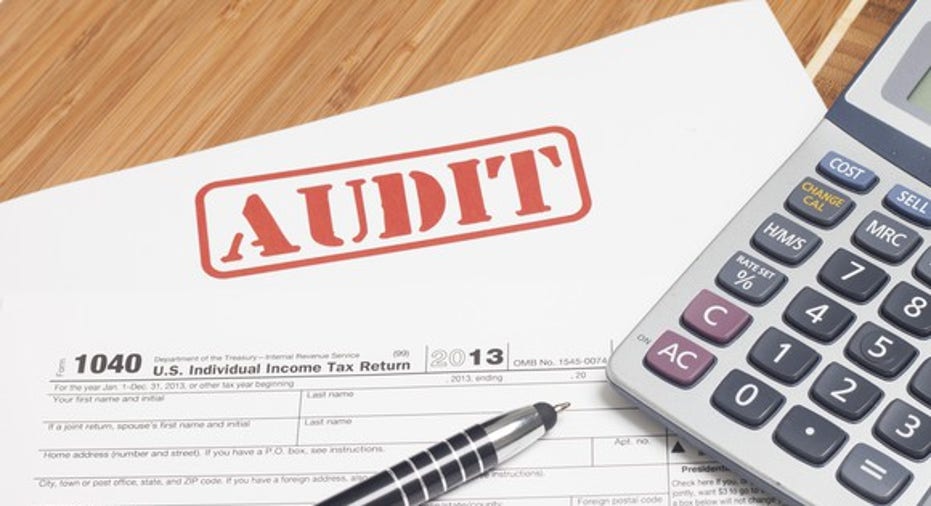3 Tax Deductions That Could Expose Your Business to an IRS Audit

Nobody likes to get audited, but for a small business, an audit can be devastating. Entrepreneurs don't have the time to deal with an extensive IRS investigation, and they also typically can't afford the high-powered accounting and legal help they'd need in order to fight an IRS audit effectively. Because getting audited is such an annoyance, it's useful to see how the IRS picks small businesses for review and how you can try to stay under the audit radar.
1. The home office deduction
Working from home is increasingly popular among self-employed individuals, especially in fields that are well-suited for remote work via the internet. The tax laws provide for such individuals to deduct the expenses that are tied to the use of their home for business purposes, but you have to follow the limitations of the home office deduction closely.
In general, you can take a portion of home expenses like utilities as a deduction based on the portion of your home used for the business. For instance, if you have a 3,000-square-foot home, and your business office is 600 square feet, then you can take 20% of shared expenses as part of the home office deduction, as the office space takes up 20% of your total square footage. In addition, you can claim 100% of certain business-only expenses, such as equipment you use solely in your business.
Image source: Getty Images.
The key to the home office deduction is that you have to use a particular portion of your home exclusively as the principal workplace for your business. That means if you or your family uses a shared workspace for other purposes than your business, you'll no longer qualify to take the deduction. That's often what the IRS looks at in an audit, especially if your home office deduction is large.
2. Business meals and entertainment expenses
One area that's fraught with abuse is in business meals and entertainment. It's easy to claim that expenses for travel, meals, entertainment, and similar pursuits have a business purpose, but if you deduct a large amount of these expenses, you'll need to be able to back your numbers up. Keeping track of who you met with and the purpose of your travel and related expenses is critical to give you the support you need if you're audited.
Make sure you keep receipts and supporting documentation to go along with your story. Moreover, be prepared for even more questions if family members accompany you on what's supposedly a business trip, or if you go to a high-profile entertainment destination -- especially if it's an international destination. Being able to show what business you discussed, along with any tangible results of the travel or entertainment, can help your case substantially.
3. Business use of your vehicle
Most small businesses require use of a vehicle, but what gets the IRS' attention is when a business owner claims 100% of a vehicle's use for the business. Some businesses can afford company cars that are dedicated for business use, and in certain occupations, specialized vehicles are necessary to provide the business's services. In those cases, it can be appropriate to claim 100% of a vehicle's expenses as a business deduction.
What isn't OK, however, is when you claim 100% of vehicle expenses for business purposes but actually use the vehicle for both personal and business reasons. In those cases, the proper method of accounting involves determining what percentage of the vehicle's use is business-related, multiplying your total vehicle expenses by that percentage, and deducting the resulting dollar amount. A travel log that shows how many miles were used for business versus personal use is the best way to substantiate whatever deduction you take.
Be smart with your business taxes
Just because these three tax breaks are red flags for an IRS audit doesn't mean you shouldn't take advantage of them. However, when you do use these tax breaks, be prepared to answer any questions by having a greater amount of documentation and support than usual. That way, even if the IRS does audit you, you'll still receive every penny of the deductions and other tax breaks to which you're entitled.
The $16,122 Social Security bonus most retirees completely overlook If you're like most Americans, you're a few years (or more) behind on your retirement savings. But a handful of little-known "Social Security secrets" could help ensure a boost in your retirement income. For example: one easy trick could pay you as much as $16,122 more... each year! Once you learn how to maximize your Social Security benefits, we think you could retire confidently with the peace of mind we're all after.Simply click here to discover how to learn more about these strategies.
The Motley Fool has a disclosure policy.



















